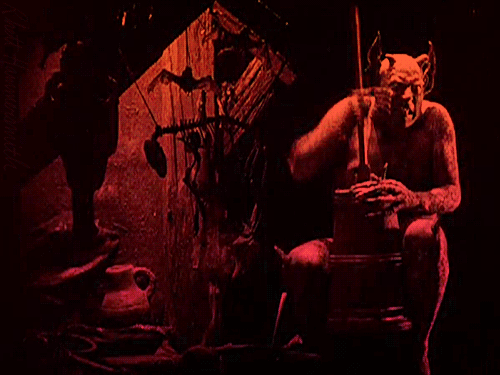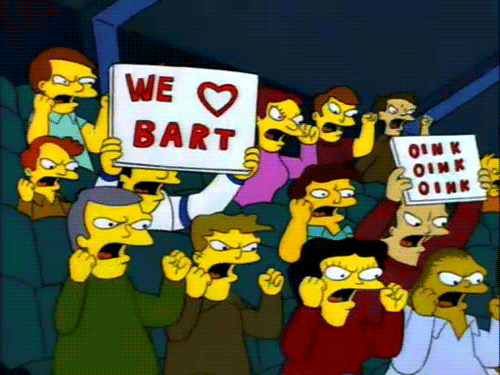I watched The Witch last night and surprisingly I actually loved it, because I really don't like horror movies and normally don't go near them. But after hearing all the good reviews, and that this was a bit more of an art house sort of film that was barely horror I thought I'd give it a go. And I thought it was great, one reason I hate horror is the cheap 'jumps' that they use to scare people and I just don't enjoy that sort of thing...whereas The Witch was just filled with this feeling of dread the whole way through. This had a lot to do with the soundtrack which was extremely unsettling at times...it also didn't help that I watched it at around 12pm. It wasn't necessarily 'scary', but definitely eery and unsettling. One thing I loved about the film was the historical setting and accuracy, which was another reason I had wanted to watch it. It felt very real, and I loved that they even used speech patterns that were accurate to the time, then you have the costumes, their style of living and everything else. Well I'm a history student so I enjoyed the accuracy for it's own sake, but it also made the film more frightening in a sense, the puritans world is created so accurately which makes their fears seem more real too. That fear is a big reason that I liked it so much, unlike the sort of horror films I don't like (I think the last horror film I watched was Paranormal Activity and before that one of the Saw films) that rely on shock factor and gore, the fear in this film was more to do with religious terror and how that tears the family apart.
I am very happy right now. You don't know what this means to me. I am so happy in fact -- that I absolve you for what you said about
Mad Max. Saints themselves could not bestow higher blessings. You are officially on the "let into heaven list". I shall have the icecream bar opened at all times for your lesiure.
The Witch was a great. I agree with everything you said. Another thing is how the movie would make you sympathetic towards the fate of that puritan family. This is an feat in-and-of-itself considering how the horror genre has so often been burdened with bland, cardboard-cutout characterization. Not only did The Witch make you care about the protagonists, it made you care about freaking puritans. Not a group that modern society tends to try to make you empathise with.
Some of this is shouldered on just how historically immerse this film is (as well as the acting -- let's not forget those folks, oh and the script too). To make us fear what they feared -- you have to be lured into their way of living, their way of seeing the world. The poverty they live under, the daily strains and insecurities this puts on them as a family, especially the oldest daughter and son. The way it presents religious terror as a means of tearing the family apart works so well because it feels natural in the context of their lives and beliefs, which we have been so elegantly immersed into.
"I just like it" works for me right now because I don't have a vocabulary to explain why I like what I like in a satisfactory manner.
Is this some sort of shadowy statement on that
Stalker write-up that you promised?

I'm already nine seasons in on South Park and I can count on one hand the number of times I've actually laughed out loud. It's more about how clever the satire is. For some reason, they didn't hit the same level of hilarity in South Park that they hit in their movies. As for Family Guy, that's the one that's gut-bustingly hilarious. South Park barely even registers on the laugh scale for me whereas I couldn't possibly hope to count the number of times I've been absolutely destroyed by something in Family Guy.
Have you seen the episode where South Park spoofs Family Guy yet?
It's rather... enlightening.
And I have no reason why ANYONE would ever care about either South Park or Family Guy when the prime-years of The Simpsons is the pinnacle of human achievement.
We're on the same wavelength, but I'd go beyond escapism/wish-fulfillment, which connote triviality/naivety, to affirmation. The relevant passage of Rand's that brought this into focus for me is the following, in which she talks about "thrillers" and why they're so awesome:
'What people seek in thrillers is the spectacle of man’s efficacy: of his ability to fight for his values and to achieve them. What they see is a condensed, simplified pattern, reduced to its essentials: a man fighting for a vital goal - overcoming one obstacle after another - facing terrible dangers and risks - persisting through an excruciating struggle - and winning. Far from suggesting an easy or “unrealistic” view of life, a thriller suggests the necessity of a difficult struggle; if the hero is “larger-than-life,” so are the villains and the dangers. An abstraction has to be “larger-than-life” - to encompass any concretes that individual men may be concerned with, each according to the scale of his own values, goals and ambition. The scale varies; the psychological relationships involved remain the same. The obstacles confronting an average man are, to him, as formidable as Bond’s adversaries; but what the image of Bond tells him is: “It can be done.”
What men find in the spectacle of the ultimate triumph of the good is the inspiration to fight for one’s own values in the moral conflicts of one’s own life. If the proclaimers of human impotence, the seekers of automatic security, protest that “life is not like that, happy endings are not guaranteed to man” - the answer is: a thriller is more realistic than such views of existence, it shows men the only road that can make any sort of happy ending possible.
Here, we come to an interesting paradox. It is only the superficiality of the Naturalists that classifies Romanticism as “an escape”; this is true only in the very superficial sense of contemplating a glamorous vision as a relief from the gray burden of “real-life” problems. But in the deeper, metaphysical-moral-psychological sense, it is Naturalism that represents an escape - an escape from choice, from values, from moral responsibility - and it is Romanticism that trains and equips man for the battles he has to face in reality.'
All of this sounds good to me. It sounds right. I can't reconcile it, though, with what you go on to talk about:
Wait... wait... wait... wait...
There is something fundementally very odd going on here. Well... odd to me at least. I'm sure it makes sense to you.

You seem to conflate the fate of the protagonist with the ability of the movie to be inspiring or not. If the protagonist wins, it inspires you to strive towards your goals and values. If the protagonist fails, it is a discouragement towards doing that.
No amount of writing can summarize how feverenly I disagree with this.
Chinatown did not make me feel that everything is hopeless. It taught me to loath injustice.
Citizen Khodos did not turn me into a cynical asshole. It thaught me the sanctity of democracy and the free press, how important those things are.
Barry Lyndon did not teach me that it is hopeless for a rootless, opportunist man to become content, happy and good. It taught me the value of having a deep sympathy towards the fates, lives and dreams of other human beings.
Obviously not every film where the protagonist fails does this. Something like Sergio Leone's
Duck, You Sucker (whose Italian title basically means "keep your head down", ie: don't engage in politics, don't stick your neck out, etc), is more about enlightening you what it really means/entails to try to achieve said values, that it most likely won't be you that will reap the benefits of said achievements even though you've shouldered all the burdensomeness, and that the cost of doing so is not worth it. Or to talk about a film you actually care about.
Raging Bull told me that Jake LaMotta could only really be who he was in the ring becuse of what he was outside the ring. Basically, to be a boxing-beast like he was entails being a self-destructive bombshell as a human being. Which is rather discouraging if you wish to emulate him in any way.
In contrast, something like
Bond is just airy reinsurance. I do not feel roused to improve myself or take a more valued stance towards an issue after seeing Bond. It's more like the perservation of the status-quo. Don't worry, supermen exist and keep the world afloot. That sort of things. There is no human connection between myself with Bond. Him winning does little for me except for stimulating my base emotions for fun and excitement.
Shane, the book, he read it years ago... he barely remembered the movie though... thought you might find that interesting.
Or
infuriating.

Haha. Yeah I think that's rather odd. Shane the book is teenage escapism just done better and more cleverly than it usually is. Shane the movie is like the Garden of Eden.
although I do think a great movie could be made using the first half of that story and then turning it into a "12 Angry Men" style debate about rights and privilege.
Oh come on and admit it! You think that about
every movie!





